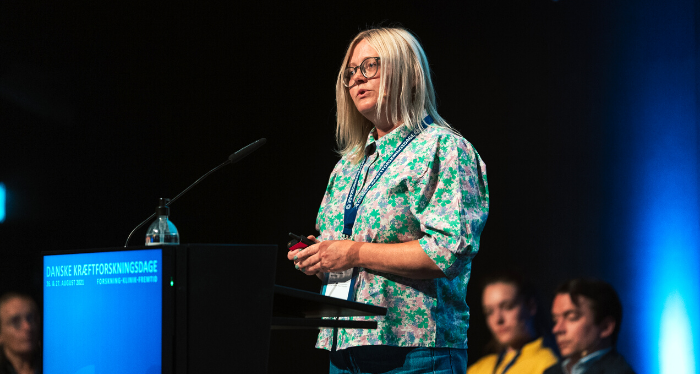
Berit presenting at Danish Cancer Research Days 2021. DKD2021; Foto Rune Borre-Jensen
09-11-2021
PRO – Patient Reported Outcome – plays an increasingly important role in research in the healthcare system in Denmark and abroad. Berit Kjærside Nielsen studies how allowing patients to express their wishes and needs in free text sheds light on what is most important to focus on in the doctor-patient meeting.
Throughout almost a decade, PRO has come to play an important role in Denmark and abroad. PRO data provides knowledge of diseases, symptoms, and side effects, which improves understanding of diseases and leads to better treatments.
Berit Kjærside Nielsen from Defactum, Central Denmark Region and colleagues from Aarhus University Hospital have initiated a study combining traditional, validated PRO questionnaires with the possibility for patients to express their wishes and needs in free text. In this way patients can become even more involved in their own treatment and care.
“In addition to the validated questionnaires, we simply ask the patients which three subjects they consider most important to discuss in their next medical consultation. The patients can write about the three subjects in free text fields”, says Berit Kjærside Nielsen who is a psychologist, senior researcher and head of the research programme in citizen and patient involvement at DEFACTUM.
Give the patients a voice
The project included 144 patients with malignant melanoma which has spread to other parts of the body. The patients received different types of treatment and most of them have appointments at hospital every three or four weeks. Before these consultations they were asked to complete a questionnaire including the possibility to fill in free text fields about what they found most important to discuss. This has provided researchers with more than 1,000 free text contributions.
”The free text contributions confirm what we already know from the medical consultations. Patients would like to talk to the doctor about symptoms and side effects; but many would also like to know more about spreading of the disease and future perspectives,” says Berit Kjærside Nielsen.
“From a psychological perspective it is interesting that many of the patients would like to discuss their future. They need to hear if the treatment works and to talk about their everyday life. The traditional PRO questionnaires do not catch this kind of information,” she says.
Room for discussion of both cure and quality of life
Traditional PRO questionnaires focus on disease and symptoms, but Berit Kjærside Nielsen’s ambition is to ask how the patients feel and involve the patients even more.
“PRO questionnaires ask about physical and psychological symptoms and side effects, but the way the questionnaires are used does not focus on what might be positive – so the logic behind “if it ain’t broke, don’t fix it” is also valid in this situation. We need to have an open dialogue about the actual purpose of PRO data. We have come to think that if we use PRO data in medical consultations, we automatically involve the patients. But that is not the case. It is important also to talk about cure and quality of life and to allow the patients to decide what should be discussed. Only in this way can we achieve true patient involvement”, Berit says.
Collecting PRO data for research purposes is important and Berit Kjærside Nielsen believes it is possible to obtain even more benefits concerning patient involvement by focusing on more than just the validated questionnaires and data generation for research purposes.
“As a psychologist, I may have a more critical angle to how things are usually done. I believe we can both generate standard PRO data and ensure real patient involvement by using the information from the free text fields in the medical consultations to strengthen patients’ joy of life, Berit Kjærside Nielsen concludes. She gave an oral presentation of her research at Danish Cancer Research Days on 26 August 2021.
